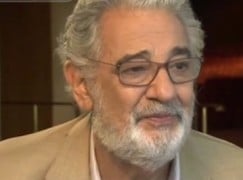The statement by the Atlanta Symphony Orchestra on the ‘breakdown of negotiations’ with musicians carefully avoided any mention of a lock-out. The L-word has acquired very bad karma since it rebounded on Minnesota.
But the intent is made clear in the small print of the ASO’s website, where the odious situation is clarified for the benefit of bewildered donors and supporters.
Here are the hard truths, in the ASO’s own words:
The contract between the ASO and the Musicians’ Union has ended, and although the musicians remain employees of the ASO, they will not receive a salary until a new contract is ratified. Health care benefits will continue through the end of September.
And then?
If, at that point, a new contract hasn’t been ratified, employees will be offered health care coverage through COBRA.
What’s that, some kind of snake?
The Consolidated Omnibus Budget Reconciliation Act (COBRA) gives workers and their families who lose their health benefits the right to choose to continue group health benefits provided by their group health plan for limited periods of time…
And the catch is?
Qualified individuals may be required to pay the entire premium for coverage up to 102 percent of the cost to the plan.
In other words, the ASO will remove health care from musicians and their families if they have not agreed to wage and job cuts by the end of the month. Brutal? Indeed, and couched in the sweetest and most convoluted euphemisms, for which the ASO is paying a PR a small fortune. This is ‘Dr’ Romanstein’s patent medicine.

The conductor Gerard Schwarz has put together a symphony orchestra of leading players from 30 top ensembles. It gets together once a year to record music for internet and the television.
All the men wear the same company tie.
‘We don’t rehearse,’ says executive director Paul Schwendener. ‘We come together and record.’
He seems quite proud of that. Judge for yourselves.

Jean Nouvel’s wonderful new hall for the Orchestre de Paris, due to open in January, is running 45 million Euros over its last approved budget of 305 million- and almost double the original projection. In normal times, the city and the ministry would split the difference. But France is in economic doldrums and the Mayor of Paris, Anne Hidalgo, has told the government she’s not paying another sou.
There’s a serious risk, we hear, that work will stop this month and the hall won’t get finished.


You can buy these from Seattle Opera (via here). Available in all operatic sizes.
The Italian media are yammering on about Robert Alagna’s refusal to return to La Scala until he’s guaranteed a non-booing show.
It’s September and they need something to write about.
More importantly, we hear that Riccardo Chailly, the incoming music director, has recovered full mobility in his right arm, broken in July, and intends to conduct the Verdi Requiem in memoriam Claudio Abbado on October 3 and 4 with Jonas Kaufmann and Anja Harteros.
The new era starts here.

A leading member of London’s music community (who requests anonymity) has posted this notice:
Tonight I walked out of my first Prom, paradoxically given by some of the greatest musicians in the world: the Berlin Phil/Rattle.
It was not the ludicrous production by (Peter) Sellars: I can cope with the Evangelist snogging the main soloists.
It was the completely misconceived musical interpretation by Rattle, a musician I have up to now admired. He had no idea about the music and its purpose. It was only a soundtrack to a production where Jesus seemed to be a bit part.
The great Christian Gerhaher remained aloof and unkissed (don’t know what happened in Part 2). Rattle seemed to have no feeling for the hymns (or anything else), especially the chorale prelude at the end of the first part. (The chorus had already fled to the flies by then).
There was no sense of the numinous or the profound. I wanted to leave after about bar 13 of the opening chorus. The inner parts of the orchestra sleek and velvety, like a Mercedes driving over the rutted cart-tracks of 18th-century Leipzig, Bach’s world and autograph manuscript. A shameful night.

photo (c) Chris Christodoulou/Lebrecht Music&Arts
Placido Domingo has just renewed his contract at LA Opera until 2019, when he will be 78. The CEO Christopher Koelsch has been renewed to 2018.

In 2019, contracts are up at the Los Angeles Philharmonic Orchestra and Hollywood Bowl for its powerful president Deborah Borda and its sought-after conductor, Gustavo Dudamel.
Opportunity knocks for the next generation.
John Fiore, music director at Norwegian Opera and Ballet, had a crisis on his hands in the second act. Here’s how he coped:

At yesterday’s final Butterfly, our wonderful soprano, Hui He, became ill on stage right after the entrance, and we had to stop.
After a while, we determined that she was too weak to continue, and I decided to come up with a Plan B, since I thought we should do something for the audience. I figured that since Butterfly does not sing from the end of the second act until her entrance after Pinkerton leaves in Act 3, we could play the Humming Chorus, and Interlude, make a small cut for “Dormi, amor mio,” and then do the trio and “Addio, fiorito asil,” which we did. I made a speech in front of the curtain, and then went into the pit and explained to the orchestra what we were doing. The chorus came onstage and sang the Humming Chorus, and we proceeded.
All in all, a difficult day, but ultimately very well handled by the people of the DNOB who were there. I just hope that Hui feels better soon.

Four hours before their contract expired, musicians of the Atlanta Symphony Orchestra sent the following email to its president, Stanley Romanstein:
While we are disappointed not yet to have received the information we requested in our recent email, we nonetheless feel the urgency of the clock upon us and wish to invite you to meet with us at your earliest convenience. We are congregating right now at the Local office, 551 Dutch Valley Road NE, Atlanta, GA 30324. We will await your arrival in order that we can present a new proposal in person. Please let us know when we might expect you and your team.
Paul (on behalf of the ASOPA Committee)
Paul Murphy
President, Atlanta Symphony Orchestra Players Association
There was no reply.
Soon after midnight, Romanstein’s office issued this slick, apparently long-prepared statement:
ATLANTA — Despite months of Collective Bargaining Agreement (CBA) discussions, the Atlanta Symphony Orchestra Players Association and Orchestra management have not reached an agreement on a new contract. As a result, the contract with the musicians’ union has expired, effective 12:00 midnight on Saturday, September 6, 2014. This development may delay or cancel portions of the scheduled 2014-15 season, which is set to open on Thursday, September 25, 2014.
Progress has been very slow, despite eight months of negotiations and ongoing transparency regarding the organization’s finances.
“We are all extremely disappointed that we do not have a new contract,” said Atlanta Symphony Orchestra (ASO) President Stanley E. Romanstein, Ph.D. “While we value the art and the artists of the ASO enormously, we believe we must develop a new model that will allow us to balance our artistic and financial needs. Clearly, that is not the model we have today.”
The ASO has had 12 consecutive years of deficit operations. In the recently completed 2013 – 2014 fiscal year, it had a $2 million deficit, even with a significant contribution from ASO Presents, the concert promotional arm of the ASO. Accumulated debt is approximately $5 million. The ASO endowment has declined to about $70 million today as the Orchestra has taken additional distributions of $18 million to cover its accumulated deficits.

The musicians gave their unspun view (full statement at the foot of this post):
As of midnight September 7th, 2014, ASO President and CEO Stanley Romanstein had refused all requests to meet with the Musicians during the final hours before the 2012-2014 CBA expired, forcing them to submit their most recent proposal electronically. The Musicians emphasized in their proposal that they wish to avoid a labor dispute and propose to continue negotiating while working under the concessionary 2012-14 contract. The musicians have received no response; it appears that the Woodruff Arts Center has locked out the Musicians of the Atlanta Symphony Orchestra for the second time in as many years.
In over eight months of negotiations, the Woodruff Arts Center and ASO Managements have displayed no willingness to find a workable agreement. They have refused to meet in person during the final days before our existing contract expired, and obstinately cling to the concessionary terms of their “last, best, and final offer,” under which the musicians would continue to hemorrhage income and lose orchestra positions.
The ASO’s spinners have avoided the inflammatory term ‘lockout’, but that is what appears to have kicked in at midnight. The musicians are out of work until and unless they knuckle down to lower pay and health care, and far fewer jobs. The ASO wants to cut its complement of musicians by up to one-third, relegating itself to a lower-league orchestra. ‘Doctor’ Romanstein – never trust a bureaucrat who signs himself ‘PhD’ – locked the musicians out two years ago and regards the last settlement as unfinished business.
Atlanta, like Minnesota, has gone into the deep, dark night of lockout through no fault of its musicians.
UPDATE: The grim terms of the lockout here.

Musicians statement in full:
Atlanta, GA September 7, 2014 12:01AM
As of midnight September 7th, 2014, ASO President and CEO Stanley Romanstein had refused all requests to meet with the Musicians during the final hours before the 2012-2014 CBA expired, forcing them to submit their most recent proposal electronically. The Musicians emphasized in their proposal that they wish to avoid a labor dispute and propose to continue negotiating while working under the concessionary 2012-14 contract. The musicians have received no response; it appears that the Woodruff Arts Center has locked out the Musicians of the Atlanta Symphony Orchestra for the second time in as many years.
In over eight months of negotiations, the Woodruff Arts Center and ASO Managements have displayed no willingness to find a workable agreement. They have refused to meet in person during the final days before our existing contract expired, and obstinately cling to the concessionary terms of their “last, best, and final offer,” under which the musicians would continue to hemorrhage income and lose orchestra positions.
Stanley Romanstein publicly accused the Musicians of not being willing to explore alternative health care solutions. Not only is that claim false – but the Musicians have offered the WAC healthcare solutions that would yield a greater savings without cutting into musician compensation any further.
According to the last, best, and final offer presented by the Woodruff Arts Center, the WAC has $3.75 million dollars available to further reduce the size of the orchestra by one third through a voluntary retirement incentive, and yet they will not apply such funding towards an agreement that we can sign. $3.75 million dollars exceeds the amount necessary to fund the musicians proposed increases. This is a WAC attempt to forever deprive the orchestra of its ability to function in the first league of orchestras.
The WAC has not demonstrated through their actions an understanding in the last two years of what is required to sustain a great American Orchestra – either artistically or financially. Because of this, the musicians can not afford to give up control to the WAC in determining the size of the orchestra. The cost of the compensation package of Atlanta Symphony Orchestra Musicians was $12.2 million dollars in 2012. The cost of the compensation package as outlined in the Musicians’ proposal of September 6th will be $11.68 million dollars in 2018, the fourth year of the proposed agreement. Under the Musicians’ proposal, the orchestra’s costs will be less in 2018 than they were six years prior in 2012.











